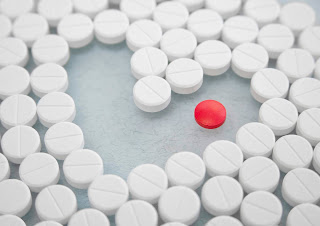Aspirin is often used as a pain reliever for
minor aches and to reduce fever. As an anti-inflammatory, it can serve as a
blood thinner and is often given
to patients immediately after a heart attack to prevent further clot formation
and cardiac tissue death.
Many take a low-dose aspirin daily to reduce the chances of
another heart attack, stroke or other heart problem, but new studies (U.S./Australia and Europe) indicate
that taking daily low-dose aspirin may not prevent a first heart attack.
Kimon Bekelis, MD, system chairman, neurointerventional services; director, stroke & brain aneurysm center, Good Samaritan Hospital explained. “New studies shed more light on the use of aspirin in the primary prevention of stroke. We still have very strong evidence that aspirin is a great drug to prevent strokes or heart attacks in patients who have already suffered from one. The two studies demonstrate that the jury is still out on using aspirin in patients at moderate risk of stroke or heart attack who haven’t suffered from one already.
Kimon Bekelis, MD, system chairman, neurointerventional services; director, stroke & brain aneurysm center, Good Samaritan Hospital explained. “New studies shed more light on the use of aspirin in the primary prevention of stroke. We still have very strong evidence that aspirin is a great drug to prevent strokes or heart attacks in patients who have already suffered from one. The two studies demonstrate that the jury is still out on using aspirin in patients at moderate risk of stroke or heart attack who haven’t suffered from one already.
In similar patients with diabetes, there appears to be a benefit
but the risk of bleeding is significant. More studies are needed to identify
the role of aspirin in the primary prevention of stroke or heart attack.”
The jury’s
verdict may be pending but there are actions you can take to help lower your
risk of first time stroke or heart attack, such as: lowering your blood
pressure, losing unhealthy weight, exercising consistently, treating diabetes
or quitting smoking. Speak with your primary care physician to discuss your
options.
For
more information and/or to connect with a CHS doctor call 1-855-CHS-4500 or
visit www.chsli.org.

No comments:
Post a Comment